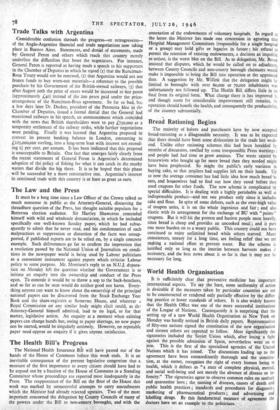World Health Organisation
It is sufficiently clear that preventive medicine has important international aspects. To say the least, some uniformity of action is desirable if the measures- taken by particular countries are not to be counteracted or rendered only partially effective by the differ- ing practice or lower standards of others. It is also widely known that the Health Office was one of the more successful institutions of the League of Nations. Consequently it is surprising that the setting up of a new World Health Organisation in New York on Monday was hardly noticed in British daily papers. Representatives of fifty-one nations signed the constitution of the new organisation and sixteen others are expected to follow. Most significantly the signatories included the Soviet Union which, after losing a fight against the possible admission of Spain, nevertheless went on to join. This is the first of the specialised agencies of the United Nations which it has joined. The discussions leading up to the agreement have been extraordinarily thorough and the constitu- tion, at the outset, recognises the right of every human being to health, which it defines as " a state of complete physical, mental, and social well-being and not merely the absence of disease or in- firmity." The signatories agree to observe common rules on sanitary and quarantine laws ; the naming of diseases, causes of death and public health practices ; standards and procedures for diagnosis ; marketing of pharmaceutical products ; and advertising and labelling drugs. By this fundamental measure of agreement the doctors have set an example to the politicians.






























 Previous page
Previous page